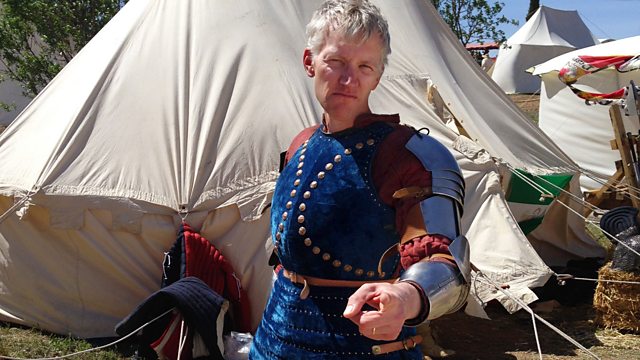29/07/2014
Tom Holland takes the chair for Radio 4's popular history programme, exploring honour amongst 18th century street fighters - both male and female.
Tom Holland is joined by Dr Hannah Skoda from the University of Oxford and the historian and biographer Dr Kate Williams.
Helen Castor joins Des Newell from Oxford Brookes University at the Peacock Gym in Canning Town, East London, to find out more about his work on eighteenth century street-fighting. In the age of the duel, what many might see as random, working-class violence was actually played out under a code of honour and was hugely important in the policing of communities before the formation of the Metropolitan Police Force.
We preview one of the big cultural events of the autumn, the British Library's celebration of the rise of Gothic literature. The exhibition is called Terror and Wonder and ties in with the 250th anniversary of Horace Walpole's The Castle of Otranto. But what was it about the 1760's that gave rise to such a powerful and enduring literary genre?
Fiona Watson reports from the Scottish Highlands on why one particular district, Lochaber, was so plagued by bandits between the 15th and 18th centuries. She's joined by Professor Allan McInnes from the University of Strathclyde who explains that the social, cultural and economic make-up of this area - as well as its geography made - for prime cattle-rustling territory.
Contact the programme by emailing making.history@bbc.co.uk, or write to Making History, ���˿��� Radio 4, PO Box 3096. Brighton BN1 1PL
Producer: Nick Patrick
A Pier production for ���˿��� Radio 4.
Last on
Street-fighting
The research of the PhD student Des Newell from Oxford Brookes University shows that – far from being a mindless activity - fighting in the eighteenth century between ordinary people (including women) was carried out according to a code which ensured that fair play was adhered to.
At the Peacock Gym in Canning Town, East London, Des argues that in the years before the formation of the Metropolitan Police, East End communities would have been governed by these unwritten rules. Some of these ‘rules’ are alluded to in this letter home from a Monsieur Cesar de Saussure in 1727:
��The lower populace is of a brutal and insolent nature, and is very quarrelsome. Should two men of this class have a disagreement that they cannot settle amicably, they retire to some quiet place and strip to the waist. Everyone who see’s them preparing to fight surrounds them, not in order to separate them, but on the contrary to enjoy, for it is a great sport for lookers on and they judge the blows and also help to enforce certain rules in this mode of warfare… The insolence of the populace is so great that as soon as an honest man has any disagreement with one of their kind, then he is at once invited to strip and fight.
Street-fighting is part of Des’s work on ‘plebeian masculinity’ and he argues that the unwritten ‘rules’ in place for fisticuffs between individuals�� were later codified and used in amateur and professional boxing.
Useful links
����
����
����
����
Terror and Wonder

To mark the 250th anniversary of the publication of Horace Walpole’s The Castle of Otranto, which was the first Gothic novel, the British Library is staging an exhibition later in the year which charts the rise and popularity of this genre.
Tom Holland spoke with one of the curators of the exhibition Tanya Kirk.
��
Image: Watercolour of the Castle of Otranto. Horace Walpole's personal copy of The Castle of Otranto. Courtesy of the British Library.
Highland Bandits
Fiona Watson heads north on the road to Glencoe to try and find out why the district of Lochaber had such problems with bandits between the 15th and 18th centuries. She meets up with Professor Alan McInnes from the University of Strathclyde who explains that much of the problem is down to the lack of centralised government, the rule of clans and the importance of male rituals. Indeed, it isn’t until the 18th century that banditry is an expression of anti-English sentiment.
��
Further Reading
Lochaber - The last bandit country, c.1600-c.1750. / MacInnes, A.
In: Transactions of the Gaelic Society of Inverness, Vol. LXIV, 2008, p. 1-21.
Making History is produced by Nick Patrick and is a Pier Production for ���˿��� Radio 4.
��
Broadcast
- Tue 29 Jul 2014 15:00���˿��� Radio 4 FM
Podcast
-
![]()
Making History
Popular history series where the past connects with the present.


